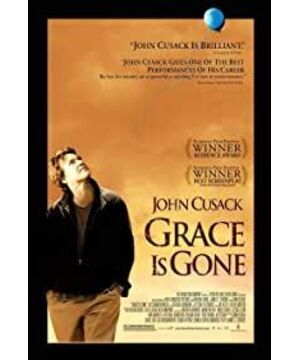Then, even this seemingly unsatisfactory life was ruthlessly shattered. Standing at the door to receive the news of his wife's death, Stanley was completely stunned. Then he listened almost like a daze as the two officers told him about the aftermath. After the wandering, he was sober with sadness and pain. How should he tell his daughter all this?
The story that followed was more like a road movie, with Stanley driving his two daughters to an amusement park. Along the way, Stanley's forbearance, grief, and forced smile in front of his daughter, the eldest daughter's precocious sensitivity and insight, and the younger daughter's innocence and innocence intertwined and collided, holding every nerve in me, and always lifting it up. Tears in my heart. Many of these scenes are unforgettable, such as the scene where Stanley fell on the bed and cried bitterly. I really had to admire John's acting skills. The cry when he lost a loved one, maybe because it was too painful and too thorough, it wouldn't be That kind of piercing, crying, but quiet, a little catharsis. The saddest pain in real life is often quiet and forbearing.
There is also Stanley's eldest daughter, who is precocious and sensitive and has already noticed the abnormality of her father. But she couldn't guess the truth behind it. Because of worry, she kept losing sleep. I like this little actor, his eyes always have a faint, irresistible melancholy. I really liked the scene where Stanley tried to get his daughter to quit smoking. Stanley pretended to be choking on the cigarette and scared his daughter, but secretly took two puffs when his daughter turned around. His expression was so cute, and it suddenly made me think how smart and loving he is. 's father.
The film also uses Stanley's mouth to discuss the issue of war. Stanley insists that war is right and just. Although he began to question after learning the news of his wife's death, he forced himself to believe in this. Faith, because once he begins to question the battle itself, the death of his wife becomes meaningless - a fact that he can never accept, and will even hit him harder than the death of his wife itself. Seeing this and thinking about john's blog, it's clear why he asked Stanley to say such a thing. John always likes to express his political views in movies, so I won't comment too much on this.
Stanley always called home on the way. The answering machine was the only way for him to hear his wife's voice. He asked his wife helplessly in the message, what should I do? How should I deal with my daughter? How can I get on with my life? Of course he will never get his wife's answer - but at the end of the film, at the end of his journey with his daughter, he has already found the answer.
At the beach, Stanley finally plucked up the courage to tell his daughters the truth. At this time, the dialogue was replaced by the background music. The three embraced and cried, and the film pushed the sadness to a climax. I really like the way this piece uses background music, turning the piercing words into flowing water-like sad notes, pouring into the hearts of the audience along with the picture, evoking the hidden pain in everyone's heart.
The film ends with the beep of the little daughter's watch. Grace is gone, but her daughter misses her at the same time every day.
When I didn't watch this movie and only watched the introduction, I thought it was a sentimental sad movie, but in fact, I didn't even cry much until the end of the movie (I'm the kind of person who will inevitably cry when seeing a sentimental part) . The tone of the whole film is very bright and warm, and there is no intention of rendering sadness at all. All emotions are conveyed through the interaction of the actors (of course, the most important thing is John), the emotions of the characters in it have a solid sense of existence. , The Stanley family is as cordial and real as neighbors, as if they are the people around us. With this, although the plot of the film is extremely simple, it is filled with such authentic and believable details, and it does not feel procrastinated or thin at all. This kind of feeling is very similar to a famous movie in Brazil, Central Station, and it is also like a road movie, a warm sketch full of vivid details. So at the end of the movie, although I didn't really cry, I was choked up by the sad emotions in the movie.
The film is translated as "Happiness is gone", but Grace left, is there really no happiness in this family? For the first time during the trip, Stanley had a deep understanding of his daughter's mind, truly understood the responsibility and responsibility of a father, and truly understood how to express how to cherish his love for his family. A family that loses a wife is destined to be deficient, but it does not prevent them from continuing to have happiness. Maybe this happiness is no longer as bright and bright as before, but there is a kind of quiet accumulation, a kind of relief and understanding that can only be understood after loss.
Happiness is still there, just turned around.
View more about Grace Is Gone reviews











